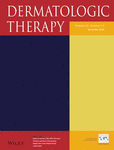Efficacy and safety of oral pioglitazone in the management of lichen planopilaris in comparison with clobetasol: A randomized clinical trial
Abstract
Lichen planopilaris (LPP) is a scarring alopecia for which no treatment with remarkable effect has been identified. Pioglitazone has been reported as a possible therapeutic option. To compare the efficacy and safety of pioglitazone with clobetasol in LPP. This randomized, double-blind, parallel-group was conducted at Razi hospital. Patients were treated either with pioglitazone 15 mg/daily or clobetasol lotion 0.05% once at night for 6 months. Patients were visited every 2 months to assess the lichen planopilaris activity index (LPPAI) and record probable adverse events. Forty patients (mean age: 43.6 years; 62.5% female) were randomized 1:1. The mean of LPPAI at baseline and last session were 4.68 ± 1.97 and 2.59 ± 0.97 in the clobetasol group and 5.01 ± 1.71 and 3.04 ± 1.36 in the pioglitazone group, respectively. Both treatments significantly decreased the LPPAI over the two-month interval visits (p < 0.001). No significant difference in the LPPAI reduction was detected between groups. Regarding the safety profile, three clobetasol-treated patients developed folliculitis, and two in the pioglitazone group developed mild headaches. Pioglitazone effectively controlled the signs and symptoms of the LPP with no serious side effects. It can be considered a treatment option for LPP, although it was not superior to clobetasol.
CONFLICT OF INTEREST
The authors declare that the research was conducted in the absence of any commercial or financial relationships that could be construed as a potential conflict of interest
Open Research
DATA AVAILABILITY STATEMENT
The data that support the findings of this study are available on request from the corresponding author. The data are not publicly available due to privacy or ethical restrictions.




